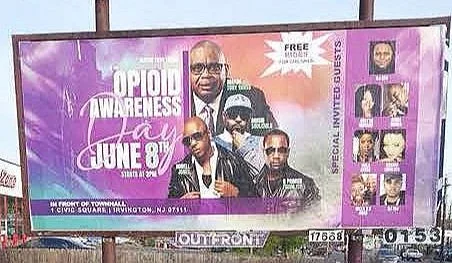New Jersey Town ‘Wasted’ Opioid Settlement Money on Concerts
/By Crystal Lindell
A town in New Jersey used its opioid settlement money for two concerts costing more than $632,000 – and a large sum of that money was used for six-figure contracts for a town employee's family businesses.
That’s according to a scathing report by New Jersey’s Office of State Comptroller (OSC), which details the ways the township of Irvington misused the money,
According to the OSC report, Irvington “wasted and misspent” opioid settlement money on two “Opioid Awareness Day” concerts in 2023 and 2024. A substantial portion of the money – $368,500 – was paid to Irvington employee Antoine “DJ Qua” Richardson and his wife, who were hired to book musical performers and deejay the event.
However, the state said Irvington officials do not know — and never asked — how Richardson actually spent the hundreds of thousands of dollars he received.
“In interviews with OSC, Richardson’s wife refused to account for the money, while Richardson claimed not to know or recall how the money was spent,” the OSC said.
State investigators determined that Irvington spent more than $200,000 on billboards and other promotional materials advertising the concerts, including $34,445 on t-shirts and $16,000 for mobile billboards, which prominently featured Irvington Mayor Tony Vauss.
Irvington also used settlement money to pay nearly $13,000 to rent luxury trailers for the performers, and $29,000 to purchase power generators and food supplies like popcorn machines, cotton candy, and shaved ice.
Irvington police officers were paid over $17,000 in overtime to provide security at the two concerts.
State investigators say “none of the billboards, promotional materials, or t-shirts that Irvington provided to OSC included information about obtaining treatment or avoiding abuse of opioids — they simply promoted the concerts.”
The organizers made only a “superficial effort” to raise awareness about opioid abuse in the town of 61,000 people, according to the report. Most of the concert material promoted the performers, the mayor, and the concerts themselves.
The stage display also made no mention of opioids. In fact, the only message displayed on stage was an ad for a “Yacht Party Cruise Around Manhattan” hosted by Richardson.
The township also didn’t allocate any of the settlement money to pay for the overdose reversal drug Narcan that was handed out at one concert.
IRVINGTON TOWNSHIP IMAGE
Instead, concert organizers requested donations for Narcan, “even though this life-saving drug was the only clearly effective measure at one of the concerts that could directly address the crisis and potentially save lives,” the OSC said.
“These funds are meant to address an ongoing public health emergency that continues to claim lives. When municipalities like Irvington fail to meet that duty, they not only waste resources but erode public trust and betray the communities most in need of support.”
Irvington officials dispute many details in the OSC report, and even went to court to block the report’s release. Mayor Vauss released a lengthy response to the report and said the township would proceed with a defamation lawsuit against acting State Comptroller Kevin Walsh and the OSC.
Walsh’s investigation wasn’t fair, according to attorney Christopher Kinum, who represents Irvington. He said state guidance on how to spend opioid settlement money was vague.
“Every municipality is using the funds for a different reason. These funds were disbursed before there was guidance. All there was, was some term — ‘evidence-based methods to combat the opioid crisis,’” Kinum told the New Jersey Monitor.
‘A Grave Misuse of Funds’
The use of billions of dollars in opioid settlement money is an issue around the country. Over $10 billion has been handed to state and local governments in recent years, and billions more are expected over the next decade. New Jersey alone has been provided over $120 million in opioid funding, with another $520 million in future payouts.
New Jersey recently diverted $45 million in settlement money to four cash-strapped hospitals to offset federal cuts in Medicaid funding. Harm reduction advocates called that a “raid of opioid settlement funds” and want the money returned.
Nevada and Connecticut also want to use settlement money to shore up social service programs hurt by federal funding cuts; while Arizona transferred $115 million in settlement money to the state prison system to help close a budget deficit.
“I have a very high level of fear that states are going to be tapping into these settlement dollars in every creative way they can to fill some of these budget shortfalls,” national recovery advocate Ryan Hampton told KFF Health News. “It’s a grave misuse of funds and one that is going to have dire consequences.”
If you want to see how your state and local government is spending opioid settlement money, you can visit a KFF Health News database or the Opioid Settlement Tracker.










